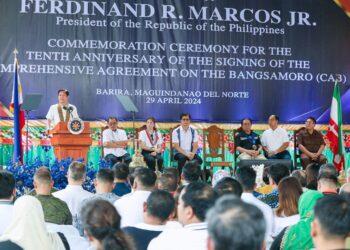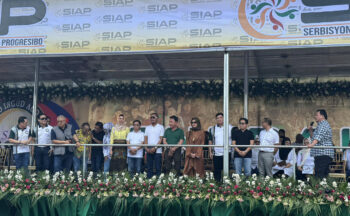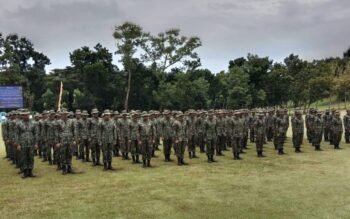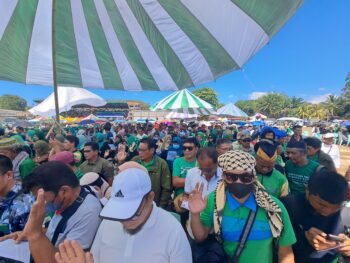(Mohahger Iqbal, chair of the peace panel of the Moro Islamic Liberation Front that negotiated and signed the Framework Agreement on the Bangsamoro and the Comprehensive Agreement on the Bangsamoro sent this piece to MindaNews to give readers a historical background on the GPH-MILF peace process as the Bicameral Conference Committee on the Proposed Bangsmaoro Basic Law deliberates on the final version of the law).
How it started
In 1998, the Philippines elected Vice President Joseph Estrada as the new president, and true to his campaign promise, he immediately sought to engage the Moro Islamic Liberation Front (MILF), and for the immediate convening of the GPH-MILF peace negotiations that started at the behest of his predecessor, President Fidel V. Ramos in November 1996. The result was almost impressive, having signed two essential agreements with little difficulty; namely, Agreement of Intent signed on August 27, 1998, and the two Joint GRP-MILF Acknowledgments of MILF Camps on February 10, 1999, and October 6, 1999.
The first agreement committed the parties to pursue peace negotiations on the substantive issues as soon as possible and to continue the said talks until reaching a negotiated political settlement. The second agreement set the parameters of the MILF camps for the ceasefire to create an atmosphere of peace and tranquility while negotiations are ongoing.
However, the early successes did not stay long. As soon as the year 2000 came in, there was a marked change in the way President Estrada dealt with the MILF. He was not only ruthless in his pronouncements, but he also ordered an all-out war against the MILF in March the same year without any regard to human civility and the agreements he already signed with the MILF.
Left with no choice, the MILF countered with all-out jihad policy and fought the government ferociously, resorting to guerrilla warfare, which is proven to be the most effective tactic against a superior enemy. Consequently, the ceasefire collapsed, and the MILF virtually abandoned the peace negotiation. Its leaders decided to go underground. They refused to heed the call of the government to return to the negotiating table, describing it as hogwash and a ploy.
Estrada ousted
Accused of plunder and found guilty of it, President Estrada was ousted from office by impeachment and people power. He was arrested and put to jail instantly. Vice President Gloria Macapagal-Arroyo was sworn in as the new president. Immediately, the new president reversed the all-out policy of her predecessor by adopting an all-out peace policy and immediately started to establish contacts with the MILF for the possible restarting of the abandoned peace process.
As a consequence of the all-out war, relations had soured at such a low ebb. Trust with the government was virtually nil. Moreover, nobody wanted to bridge the great divide.
What made reengagement possible? Three milestones paved the way for the resumption of the peace process.
The first was the visit of President Arroyo to Kuala Lumpur in February 2001 to request the Malaysian Government to act as third-party facilitator after reviving the abandoned GPH-MILF peace negotiations. Second, the positive response of the Prime Minister Tun Dr. Mahathir Mohamad, to the offer as the third-party facilitator, but with a caveat that the MILF agrees to resume the talks. The last point is the third milestone.
Henceforth, Prime Minister Tun Dr. Mahathir Mohamad sent a three-person delegation to the MILF in early 2001. The delegation was led by the late Tengku Dato’ Abdul Ghafar bin Tengku Mohamed. Two others, as members, accompanied him, namely Hasanah binti Abdul Hamid, the former Director General of the Research Department of the Prime Minister’s Department, and Nik Abdul Aziz Nik Mat, who remains connected with the facilitation to this day. The delegation met the MILF Central Committee led by the late Chairman Salamat Hashim in Buliok, Pagalungan, Maguindanao.
The official reply of the MILF, as expected, was to be conveyed later. So, after a thorough and diligent study, the MILF responded positively to the offer to resume the talks, with Malaysia as the third-party facilitator.
Under Malaysian facilitation, the government and MILF met in Kuala Lumpur on March 24, 2001, and agreed to resume their formal negotiations immediately, to honor, respect, and implement all past agreements, and to undertake relief and rehabilitation of evacuees. Then in June, the same year, they met in Libya to hold the formal talks and after some “stormy session,” they signed the Tripoli Agreement on Peace on June 22, 2001. This agreement is considered the “mother of all agreements” of the parties.
The Malaysian Secretariat
As the third-party facilitator, the tasks of facilitation and other related functions fell squarely on the Research Department of the Prime Minister’s office. In fact, almost all of those appointed Malaysian third-party facilitator from 2001 to 2016 were either head of this department or had served in senior capacity therein: Tan Sri Zakaria bin Abdul Hamid, Datuk, now Tan Sri, Othman bin Abdulrazak, and the late Tengku Dato’ Abdul Ghafar bin Tengku Mohamed. Perhaps, the only exception is the current Malaysian Facilitator/Special Advisor Dato Kamaruddin bin Mustapha, who had served in the foreign ministry as ambassador.
It is perhaps again a matter of coincidence that Datuk Hasanah who was the Head of the Secretariat in 2001 and during her tenure as Director General of Research Department had continued to be responsible for the back-channeling efforts with the Philippine government when the peace panels entered into an impasse or needed higher level intervention. Datuk Hasanah had also been the key person to elevate this process to the OIC and secure the support of the Secretary-General and members of the OIC.
However, this department is a large agency which deals with many matters, and therefore, decided that a select group called the Malaysian Secretariat would be organized. The group, which is under the control and supervision of the Research Department, handles all matters related to the facilitation of the GPH-MILF peace process.
The third-party facilitation is considered the most crucial international involvement in the peace process. However, aside from being the host, Malaysia also served as go-between conveying positions of the parties. As such, Malaysia provided a conducive atmosphere, venue, and facilities; presided the talks as “referee” in case of misunderstandings; helped bridge differences by shuttling between the parties; administered the discussions; and, recorded and kept minutes, including the commitments and agreements made in the course of the talks.
For the past 17 years, Malaysia has been active, efficient and thriving in this role, according to the general feedback from the negotiators of both sides as well as close observers, like those in the International Contact Group (ICG). The common Malay culture and temperament among the key players no doubt eased Malaysian facilitation, and its regular role made it the constant figure in the ups and downs of the peace process.
Research on internal conflict in the Philippines is not exempt from the tendency of attributing mostly positive outcomes to third parties. Works that consider international intervention as a constraint for conflict resolution are few and far between or were not taken seriously by honest observers. The case of Malaysia is of course not in the loop, because it did not become part of the process by its own volition; it was invited by the Philippine government and concurred in by the MILF. That to me makes the Malaysian facilitation as a grand success and a model that encourages or tempts students of negotiation and facilitation worthy of examining.
What a great coincidence!
When the GPH-MILF peace process was elevated to the diplomatic stage, after it collapsed during the all-out war waged against the MILF by President Estrada, the sitting prime minister of Malaysia was Tun Dr. Mahathir Mohamad. Under his watch, as head of the facilitating country, this peace process started. Today, this process is in the crucial and last stage, and if no severe incidents happen, the end of the process is already in the pipeline. He is again the Prime Minister of Malaysia.
What a great coincidence! Indeed, this is amazing! One definitely for the books!
The truth is that nobody ever predicted that Tun Mahathir would come back to power after he voluntarily retired from politics, which few leaders especially politicians, would ever dare. To most, if not all of them, power is not only addicting but a source of everything. Name it, and it is associated with power and influential people.
Tun Mahathir is an exception. He retired from politics before people would shove him away, like the fate of many other leaders before and today. He is indeed the father of all Malaysians. Despite his age – 93 — which is seen as too old to run a country, he still won a new mandate to lead his people.
The MILF had already sent a congratulatory message for his victory, and in fact, it is seriously contemplating on sending a delegation headed no less by MILF Chair Al Haj Murad Ebrahim this month or early next month.
We look forward to the new government of Tun Mahathir to continue to support and use its influence on the parties especially at this time when the process is at its finishing stage.
Now the Bangsamoro Basic Law (BBL), the law that will implement the Comprehensive Agreement on the Bangsamoro signed by the parties on March 27, 2014, is about to complete its legislative process in the Philippine Congress. It is scheduled to be finalized by a joint bicameral committee conference within this month of July 2018 and to be submitted to the President for signature before or during his State of the Nation Address (SONA) on July 23, 2018.
Be that as it may, one of the real challenges that we are facing is the introduction of so many amendments, deletions, and substitutions in the original law crafted by a Joint GPH-MILF Bangsamoro Transition Commission (BTC). These amendments are manifestly contrary to the letter and spirit of the CAB and the existing R.A. 9054 that created the Autonomous Region in Muslim Mindanao (ARMM).
For now, we are working hard and continue to engage the President and members of both Houses with the hope that the final version of the BBL is compliat with the CAB and carries with it all those powers granted to the ARMM by R. A. 6734, R.A. 9054 and other executive issuances.
Moreover, once the BBL acceptable to the MILF and the Bangsamoro people is secured, the support of Malaysia and the international community is needed and crucial, especially in the normalization process whereby no less than 40,000 MILF combatants are going to be decommissioned and return to productive civilian life.
In such a radical and abrupt change in their lives, from active combat to civilian life, it is a problematic transformation even mentally to say the least. Without parallel socio-economic intervention, they might be tempted, especially if frustration rules the day, to join other armed groups who are still active in fighting the government.
In this developing scenario, we look up to Malaysia as a reliable and steady source of relief not only in making peace possible through the signing of the peace agreements but more so during the final phase of the conflict resolution in Mindanao. Rebuilding and rehabilitating a devastated region like the Bangsamoro require years to accomplish and massive help from all sources especially the international community.
(Mohagher Iqbal has been chair of the Moro Islamic Liberation Front’s Peace Negotiating Panel since 2003. He was also a member of the MILF panel during the domestic stage of the talks from January 1997 until mid-2000. He also served as chair of the first Bangsamoro Transition Commission from December 2012 under the Aquino administration until June 30, 2016 when the Duterte administration took over. When the second BTC was organized in 2016, he was appointed as one of its 21 commissioners)







